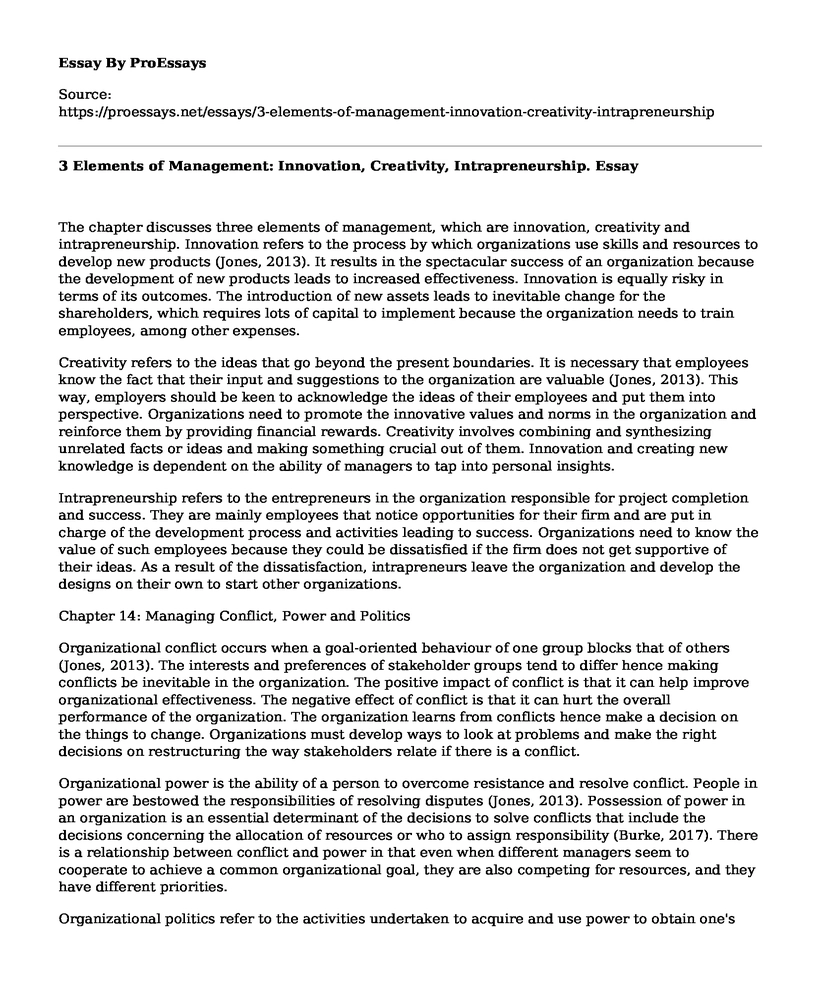The chapter discusses three elements of management, which are innovation, creativity and intrapreneurship. Innovation refers to the process by which organizations use skills and resources to develop new products (Jones, 2013). It results in the spectacular success of an organization because the development of new products leads to increased effectiveness. Innovation is equally risky in terms of its outcomes. The introduction of new assets leads to inevitable change for the shareholders, which requires lots of capital to implement because the organization needs to train employees, among other expenses.
Creativity refers to the ideas that go beyond the present boundaries. It is necessary that employees know the fact that their input and suggestions to the organization are valuable (Jones, 2013). This way, employers should be keen to acknowledge the ideas of their employees and put them into perspective. Organizations need to promote the innovative values and norms in the organization and reinforce them by providing financial rewards. Creativity involves combining and synthesizing unrelated facts or ideas and making something crucial out of them. Innovation and creating new knowledge is dependent on the ability of managers to tap into personal insights.
Intrapreneurship refers to the entrepreneurs in the organization responsible for project completion and success. They are mainly employees that notice opportunities for their firm and are put in charge of the development process and activities leading to success. Organizations need to know the value of such employees because they could be dissatisfied if the firm does not get supportive of their ideas. As a result of the dissatisfaction, intrapreneurs leave the organization and develop the designs on their own to start other organizations.
Chapter 14: Managing Conflict, Power and Politics
Organizational conflict occurs when a goal-oriented behaviour of one group blocks that of others (Jones, 2013). The interests and preferences of stakeholder groups tend to differ hence making conflicts be inevitable in the organization. The positive impact of conflict is that it can help improve organizational effectiveness. The negative effect of conflict is that it can hurt the overall performance of the organization. The organization learns from conflicts hence make a decision on the things to change. Organizations must develop ways to look at problems and make the right decisions on restructuring the way stakeholders relate if there is a conflict.
Organizational power is the ability of a person to overcome resistance and resolve conflict. People in power are bestowed the responsibilities of resolving disputes (Jones, 2013). Possession of power in an organization is an essential determinant of the decisions to solve conflicts that include the decisions concerning the allocation of resources or who to assign responsibility (Burke, 2017). There is a relationship between conflict and power in that even when different managers seem to cooperate to achieve a common organizational goal, they are also competing for resources, and they have different priorities.
Organizational politics refer to the activities undertaken to acquire and use power to obtain one's preferences (Jones, 2013). To manage conflicts, individuals engage in activities that enhance the influence they have on others. The tactics for playing politics include becoming indispensable, non-substitutable, and central. One needs to associate with powerful managers because these people often become mentors to aspiring employees. It is believed that organizational politics has the ability to manipulate decision making because judgement will be based on the interests of the person in power.
References
Burke, W. W. (2017). Organization change: Theory and practice. Sage publications.
Jones, G., R. (2013). Chapter 13: Innovation, intrapreneurship and creativity: Organizational theory in action practicing.
Jones, G., R. (2013). Chapter 14: Managing conflict, power and politics; Organizational theory in action practicing
Cite this page
3 Elements of Management: Innovation, Creativity, Intrapreneurship.. (2023, Mar 26). Retrieved from https://proessays.net/essays/3-elements-of-management-innovation-creativity-intrapreneurship
If you are the original author of this essay and no longer wish to have it published on the ProEssays website, please click below to request its removal:
- Expansion of a Business
- Definition of Entrepreneurial Opportunity and Innovation Paper Example
- Business Groups Argumentative Essay
- Solutions to International Business Scenarios and Problems Essay
- Gaining Financial Support: The Key to Entrepreneurial Success - Essay Sample
- Essay Example on Holidays are a Sacred Necessity: Responsible Tourism in the Media
- Essay Example on Going Global: Essential Ethical Standards for Businesses







